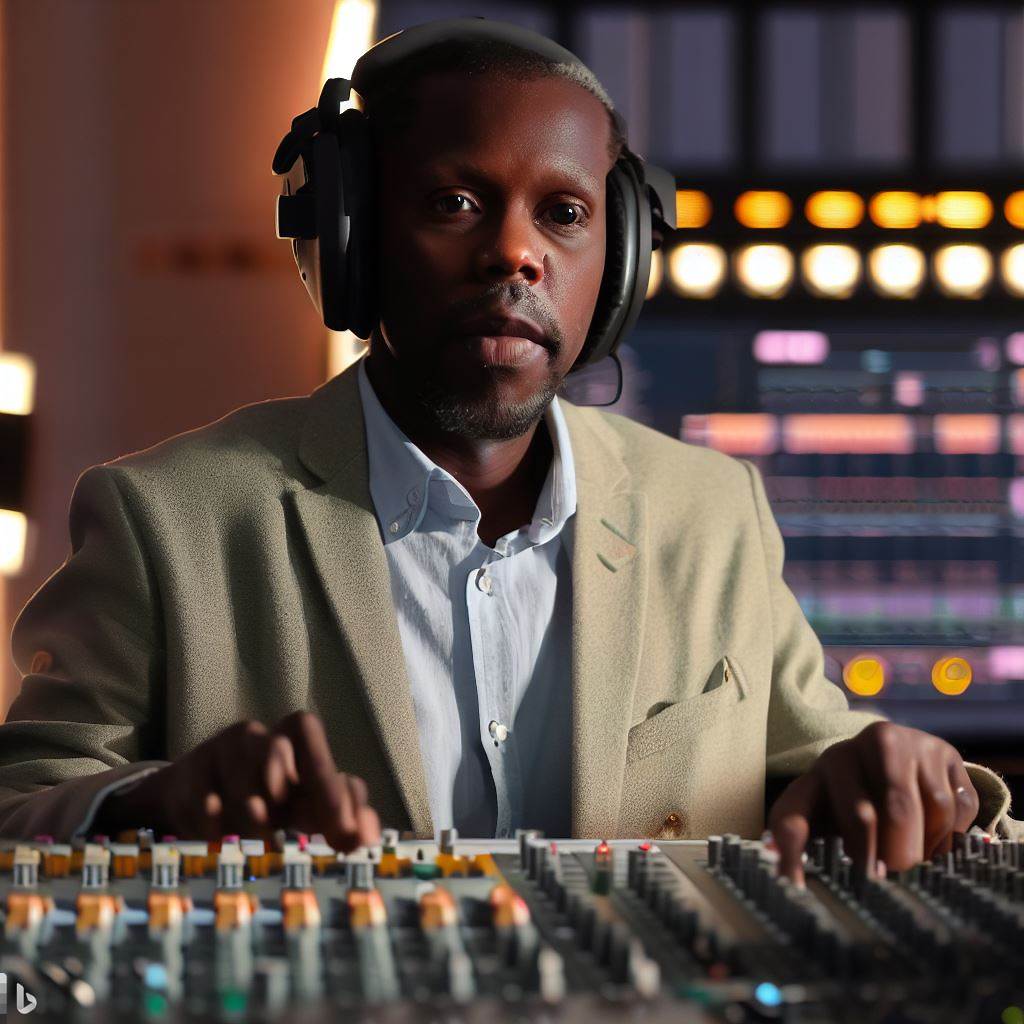Introduction
A performer’s manager plays a crucial role in the Nigerian entertainment industry, ensuring the success and well-being of artists.
In Nigeria, the entertainment industry is thriving, known for its vibrant music, film, and fashion sectors. The role of a performer’s manager is especially significant in this dynamic and competitive environment.
A performer’s manager is responsible for overseeing the career, bookings, and overall success of artists.
They handle negotiations, contracts, and promotional activities, ensuring that the performer’s interests are protected and opportunities are maximized.
Overview of the Nigerian Entertainment Industry
The Nigerian entertainment industry is a powerhouse, contributing significantly to the country’s economy.
Nollywood, the Nigerian film industry, is the third-largest in the world, producing hundreds of movies annually.
Nigerian musicians, like Burna Boy and Davido, have gained global recognition, attracting international collaborations and touring opportunities.
The vibrant fashion industry, with designers like Lisa Folawiyo and Mai Atafo, showcases Nigeria’s unique style and creativity.
The Importance of a Performer’s Manager in Nigeria
In the highly competitive Nigerian entertainment industry, a performer’s manager plays a vital role in navigating the complexities and challenges.
They provide guidance, support, and strategic planning to ensure the artist’s growth and longevity.
Managers handle the business aspect, allowing the artist to focus on their craft and artistic expression.
The role of a performer’s manager is crucial in the Nigerian entertainment industry.
They guide and protect the interests of artists, enabling them to thrive in this dynamic and highly competitive industry.
Without the dedication and expertise of a performer’s manager, many talented artists would struggle to succeed and reach their full potential.
Responsibilities of a Performer’s Manager
A performer’s manager in Nigeria has numerous responsibilities that contribute to the success of the artist or performer they represent.
This section will delve into the key tasks and roles a manager undertakes.
Talent Scouting and Auditions
One crucial responsibility of a performer’s manager is talent scouting and auditioning potential artists or performers.
The manager actively seeks out individuals who possess exceptional talent and show potential for success in the entertainment industry.
They attend various events, such as concerts, talent shows, and auditions, not only to spot upcoming talent but also to network and build relationships with other industry professionals.
Contract Negotiation and Management
When a manager finds a promising artist or performer, their next responsibility is to negotiate contracts on their behalf.
This involves securing favorable terms and conditions for the artist’s performances, appearances, and partnerships.
The manager ensures that the artist is protected legally and financially by reviewing and managing contracts with record labels, event organizers, agents, and other stakeholders in the industry.
Project Coordination and Scheduling
A performer’s manager handles project coordination and scheduling to ensure smooth and efficient operations.
They organize rehearsals, studio sessions, and performances while considering the artist’s availability and optimizing their time.
Managers are responsible for creating timelines, setting deadlines, and overseeing the artist’s activities to ensure all projects are completed in a timely manner and meet the artist’s goals and objectives.
Promotional Activities and Branding
Promoting the artist and building their brand is a crucial aspect of a manager’s responsibilities.
They develop strategic marketing plans, coordinate promotional campaigns, and establish the artist’s presence across various media platforms.
From social media management to organizing media interviews, the manager constantly works towards enhancing the artist’s visibility and public image.
They collaborate with publicists, influencers, and brand partners to maximize exposure and reach a wider audience.
Financial Management and Budgeting
Financial management and budgeting are paramount responsibilities of a performer’s manager.
They handle the artist’s finances, including income, expenses, and investments, to ensure financial stability and growth.
The manager creates budgets for projects, manages income streams (such as performance fees, merchandise sales, and endorsements), and handles accounting tasks.
They also advise the artist on financial matters and make strategic financial decisions to maximize earnings and opportunities.
Essentially, a performer’s manager in Nigeria carries out a multitude of tasks and roles to support the success of the artist.
From talent scouting and contract negotiation to project coordination and financial management, their active involvement is the backbone of an artist’s career.
Read: How Nigerian Music Styles Influence Mixing Engineering Techniques
A Day in the Life of a Performer’s Manager in Nigeria
Being a Nigerian performer’s manager is both demanding and rewarding. Managers kick off the day by checking emails promptly for urgent matters.
Scheduled meetings are vital for strategizing projects and collaborations. Meticulous contract reviews guarantee optimal deals for clients.
Coordinating rehearsals and ensuring smooth performances are paramount.
Attending events and networking foster collaboration and promotion. Active curation of clients’ online presence engages fans on social platforms.
Adept problem-solving tackles challenges like cancellations and conflicts. Nigerian managers, with dedication, shape performers’ careers through connections, ensuring industry success.
Read: Skills Needed to Thrive as an Artists’ Manager in Nigeria
Skills and Qualities Required for the Job
A performer’s manager in Nigeria needs a wide range of skills and qualities to effectively handle the demands of the job.
Below are some of the key skills and qualities required:
Strong communication and interpersonal skills
A performer’s manager must have excellent communication skills to effectively interact with artists, industry professionals, and clients.
They need to be able to clearly articulate ideas, negotiate contracts, and build relationships.
Excellent organizational and multitasking abilities
Managing multiple artists and their schedules requires exceptional organizational and multitasking abilities.
A performer’s manager must effectively prioritize tasks and stay on top of all the details to ensure smooth operations.
Knowledge of the Nigerian entertainment industry
An in-depth understanding of the Nigerian entertainment industry is essential for a performer’s manager.
They need to stay up to date with trends, industry players, and the dynamics of the market to make informed decisions and seize opportunities.
Negotiation and contract management skills
Negotiating contracts and securing favorable deals are crucial aspects of the job.
A performer’s manager must possess strong negotiation skills and be adept at contract management to protect the interests of their artists.
Financial management and budgeting expertise
A performer’s manager is responsible for handling the financial aspects of their clients’ careers.
They need to have a solid understanding of financial management and budgeting to ensure artists’ earnings are maximized and funds are allocated wisely.
Problem-solving and decision-making capabilities
In the dynamic entertainment industry, challenges and unforeseen situations are common.
A performer’s manager must possess problem-solving and decision-making capabilities to handle crises, resolve conflicts, and make tough choices that benefit their artists.
Overall, being a performer’s manager in Nigeria requires a combination of business acumen, industry knowledge, and interpersonal skills.
This role demands individuals who can effectively navigate the complex entertainment landscape while prioritizing the best interests of their clients.
Read: Mixing Engineer vs. Mastering Engineer: Roles in Nigeria’s Music

Success Stories from Performer’s Managers in Nigeria
Successful career trajectories of managed artists
- Omotara Johnson, a talented singer, went from performing at small local events to selling out major arenas.
- Ngozi Ahmed, a dynamic dancer, transformed from struggling to make ends meet to performing on international stages.
- Tunde Ojikutu, a charismatic actor, rose to fame and became a household name through his manager’s guidance.
How managers contributed to their success
- The managers provided valuable connections and networking opportunities to help their artists gain exposure.
- They negotiated lucrative contracts and deals, ensuring their artists received fair compensation for their talent.
- Managers coordinated promotional campaigns and marketing strategies to grow their artists’ fanbase.
Insights into the strategies used by managers
- Building strong relationships with industry professionals, such as producers and record labels, was crucial.
- Managers organized regular rehearsals and training sessions to enhance their artists’ skills and stage presence.
- They utilized social media platforms to engage and interact with fans, creating a loyal and dedicated following.
Success Case Study: Omotara Johnson
Omotara Johnson’s manager, Adeolu Oladejo, played a significant role in her rise to stardom.
When Oladejo first discovered Omotara singing at a local bar, he immediately recognized her immense talent.
He saw the potential in her voice and believed she could captivate audiences on a larger scale.
Oladejo utilized his extensive network in the music industry to secure Omotara a recording deal with a renowned record label.
Through careful negotiations, he ensured that Omotara received a fair contract that not only granted her artistic freedom but also guaranteed significant financial rewards.
To enhance Omotara’s career, Oladejo devised a marketing strategy that targeted both traditional media and digital platforms.
He organized radio interviews, TV appearances, and live performances to increase her exposure.
Additionally, he leveraged social media to create a strong online presence, interacting with fans and promoting her music.
The result was remarkable. Omotara’s debut album sold millions of copies, and she embarked on a nationwide tour, performing to sold-out venues.
Oladejo’s strategic approach to talent management propelled Omotara to the forefront of the Nigerian music industry, turning her into a household name.
Lessons Learned from Success Stories
- A competent manager can create opportunities and open doors for artists.
- Effective negotiation skills are essential for securing favorable contracts and ensuring artists’ well-being.
- Marketing and promotion play crucial roles in building a successful artist’s career.
- Building a strong network and establishing connections with industry professionals are vital for growth.
Lastly, performer’s managers in Nigeria have played instrumental roles in the success stories of many artists.
Through their guidance and strategic planning, they have transformed struggling musicians, dancers, and actors into national and international sensations.
Their ability to recognize talent, create opportunities, and navigate the complex entertainment industry has been key to their artists’ triumphant career trajectories.
Read: Behind the Sounds: Interviews with Top Nigerian Mixing Engineers
Challenges and Rewards of Being a Performer’s Manager in Nigeria
Managing artist’s diva-like behavior and expectations
One of the challenges of being a performer’s manager in Nigeria is dealing with their diva-like behavior and high expectations.
Managing artists who often demand special treatment and have unrealistic expectations can be a daunting task.
It requires tact, diplomacy, and strong communication skills to navigate their egos and keep them satisfied.
Navigating competition and industry politics
In Nigeria’s highly competitive entertainment industry, managers face the challenge of navigating fierce competition and industry politics.
There is a constant struggle to secure the best opportunities for their artists and ensure they are not overshadowed by other performers.
Managers often have to negotiate deals, build relationships with industry insiders, and stay updated on the latest trends and gossip.
Balancing work-life commitments and long hours
Being a performer’s manager in Nigeria requires immense dedication and long hours of work.
Managers have to be available at all times to handle emergencies, last-minute changes, and address their artists’ needs.
It can be challenging to find a balance between work and personal life, as the job requires constant availability and flexibility.
The gratification of seeing artists succeed
Despite the challenges, one of the biggest rewards of being a performer’s manager in Nigeria is witnessing their success.
Seeing an artist you manage achieve their goals, gain recognition, and experience financial growth is incredibly satisfying.
Being a part of their journey and contributing to their success can bring a great sense of accomplishment and pride.
Building a strong professional network and reputation
Being a performer’s manager in Nigeria offers the opportunity to build a strong professional network and reputation.
Working alongside industry professionals, promoters, and other managers allows for valuable connections to be made.
Publish Your Professional Profile, Business or Brand
Showcase your expertise, gain trust, and boost visibility instantly on Professions.ng.
Publish NowA manager’s reputation is crucial in the industry, and successful collaborations and positive word-of-mouth can lead to more opportunities.
In short, being a performer’s manager in Nigeria comes with its own set of challenges and rewards.
From managing diva-like behavior and high expectations to navigating competition and industry politics, the job requires resilience and resourcefulness.
However, the gratification of witnessing an artist’s success, building a strong professional network, and contributing to the thriving entertainment industry make it a fulfilling and rewarding career choice.
Explore Further: Creating Hits: The Role of Music Producers in Nigeria’s Pop Scene
Conclusion
Recap of a performer’s manager’s role and responsibilities
In summary, a performer’s manager plays a crucial role in the success of an artist.
They handle day-to-day operations, bookings, and negotiations, ensuring the artist’s career runs smoothly.
They act as a liaison between the artist and industry professionals, protecting the artist’s interests.
Importance of managers in Nigeria’s entertainment industry
Managers are vital in Nigeria’s entertainment industry as they provide guidance, support, and strategic planning for artists.
They navigate the complex industry, opening doors to opportunities and helping artists reach their full potential.
Encouragement for aspiring performer’s managers in Nigeria
To aspiring performer’s managers in Nigeria, this industry offers countless possibilities.
With dedication, passion, and a solid understanding of the business, you can make a significant impact on the careers of artists.
Embrace the challenges, continue learning, and always prioritize the best interests of your clients.
Remember, a performer’s manager holds the key to unlocking success for artists, shaping their careers, and leaving a lasting mark on Nigeria’s entertainment industry.




